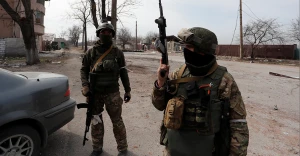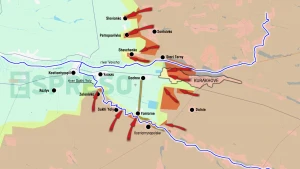
History of modern warfare is about putting together puzzles from network data
The number one topic right now is, of course, the leaked documents from the U.S. Defense Department. Of course, like any 'top issue,' this has given rise to discussions, versions, and predictions
Some claim that this is all a 'targeted leak' of documents, while others are convinced of the opposite. I was personally interested in how this story reflects the mechanisms of information dissemination in modern society.
If you take a closer look at the 'data' used in the 'leak,' it is not something extremely new and disruptive to the usual picture of the world. In fact, modern warfare is an era dominated by OSINT-ers who meticulously collect data fragments from the network and draw conclusions. And there are plenty of such fragments, because we live in an era of mass access to the Internet, widespread 'smartphoneization' and 'digitalization.' Therefore, everything that happens is likely to leave traces on the Internet. And what is posted online will never disappear.
So, if this data resembles the usual OSINT (Open source intelligence - ed.), isn't it a product of it? In fact, why does everyone think that somewhere in the American headquarters they should not be engaged in OSINT?
And here we are approaching a certain inertia in our thinking that comes from past eras. Society is generally convinced that there is a certain 'truth' that must be 'hidden' from it. In general, this opinion is based on the long experience of coexistence between the state and society, during which the state did indeed in many cases restrict citizens' access to information. However, the encounter with real restrictions also had another side - the belief that there is 'hidden information' on any issue, which means 'truth' and which is hidden somewhere in a remote safe.
“Society is generally convinced that there is some 'truth' that must be 'hidden' from it. In general, this opinion is based on the long experience of coexistence between the state and society, during which the state did in many cases restrict citizens' access to information.”
Who has a monopoly on 'truth!'. Obviously, the Pentagon can be considered such a monopolist. This means that everything that is 'leaked' from there is the truth! 'The hidden truth!'
Although it is clear that in any agency there are a lot of analysts who are constantly analyzing something, producing documents of various values, and they produce them, among other things, based on various 'open sources,' because an analytical note must be written 'for yesterday,' and you write whatever you can write.
The concept of 'hidden truth' made this 'leak' an information bomb. Not the content.
And about information. In the past, the main task for any analysis was to find information. Now there is so much information that the main problem is to isolate information about something useful. And this is a much more difficult task than just finding data.
“In the past, the main task for any analysis was to find information. Now there is so much information that the main problem is to isolate information about something useful. And this is a much more difficult task than just finding data.”
It's impossible to hide anything now, because someone will film something somewhere. Simply because he is a narcissistic idiot who wants to raise his 'status.' A striking example is the rocket attacks on Ukraine. No matter how many people say that they shouldn't film and post missile hits, no matter how many people are brought to justice for doing so, they will not stop filming. Because for some people, seeing a missile hit is a major life event.
Therefore, the only way to hide something now is to overload information channels with spam, so that it takes a long time to figure out what is true and what is not. And spam in this case is not about fiction. It's about data that may well be objective. It just doesn't have too much value. And there is a huge amount of such data generated in the world. Especially on 'particularly significant topics.' On these topics, you will always find 'leaks,' 'analyst bloggers,' 'secret messages from a godfather, a friend, a brother,' and prophecies from soothsayers and molfars. And there may indeed be something interesting and useful among all this noise. But how to find it?
Source
About the author. Petro Oleshchuk, political scientist.
The editors don't always share the opinions expressed by the authors of the blogs.
- News












































